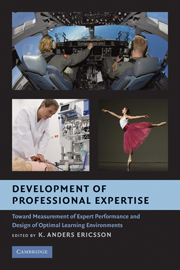 Development of Professional Expertise
Development of Professional Expertise Book contents
- Frontmatter
- Contents
- List of Figures
- List of Tables
- List of Contributors
- 1 The Measurement and Development of Professional Performance: An Introduction to the Topic and a Background to the Design and Origin of This Book
- SECTION 1 CHALLENGES IN PAST AND CONTEMPORARY EFFORTS TO MEASURE AND TRAIN THE OBJECTIVE PERFORMANCE OF PROFESSIONALS
- SECTION 2 PAST AND CONTEMPORARY EFFORTS TO DESIGN INSTRUCTION, TRAIN, AND MAINTAIN PROFESSIONAL PERFORMANCE
- SECTION 3 THE ASSESSMENT AND TRAINING OF SKILLED AND EXPERT PERFORMERS IN THE MILITARY
- 10 Toward a Second Training Revolution: Promise and Pitfalls of Digital Experiential Learning
- 11 Evaluating Pilot Performance
- 12 Contrasting Submarine Specialty Training: Sonar and Fire Control
- 13 Training Complex Cognitive Skills: A Theme-Based Approach to the Development of Battlefield Skills
- 14 Structuring the Conditions of Training to Achieve Elite Performance: Reflections on Elite Training Programs and Related Themes in Chapters 10–13
- SECTION 4 THE DEVELOPMENT OF EXPERTISE AND EXPERT PERFORMANCE
- Name Index
- Subject Index
- References
13 - Training Complex Cognitive Skills: A Theme-Based Approach to the Development of Battlefield Skills
Published online by Cambridge University Press: 04 August 2010
- Frontmatter
- Contents
- List of Figures
- List of Tables
- List of Contributors
- 1 The Measurement and Development of Professional Performance: An Introduction to the Topic and a Background to the Design and Origin of This Book
- SECTION 1 CHALLENGES IN PAST AND CONTEMPORARY EFFORTS TO MEASURE AND TRAIN THE OBJECTIVE PERFORMANCE OF PROFESSIONALS
- SECTION 2 PAST AND CONTEMPORARY EFFORTS TO DESIGN INSTRUCTION, TRAIN, AND MAINTAIN PROFESSIONAL PERFORMANCE
- SECTION 3 THE ASSESSMENT AND TRAINING OF SKILLED AND EXPERT PERFORMERS IN THE MILITARY
- 10 Toward a Second Training Revolution: Promise and Pitfalls of Digital Experiential Learning
- 11 Evaluating Pilot Performance
- 12 Contrasting Submarine Specialty Training: Sonar and Fire Control
- 13 Training Complex Cognitive Skills: A Theme-Based Approach to the Development of Battlefield Skills
- 14 Structuring the Conditions of Training to Achieve Elite Performance: Reflections on Elite Training Programs and Related Themes in Chapters 10–13
- SECTION 4 THE DEVELOPMENT OF EXPERTISE AND EXPERT PERFORMANCE
- Name Index
- Subject Index
- References
Summary
Professionals face unexpected challenges every day. The sector of our society that has had the most experience preparing for unexpected crises situations is the military. As a result of the contemporary operational environment, soldiers have experienced the need to adapt to virtually continuous changes in technical equipment and skills, as well as unique radical changes resulting from differences in conventional war and guerilla war. This has led to an increased need to develop adaptability skills in Army leaders (e.g., Barnes, 2005; Wong, 2004). For example, Barnes (2005) wrote, “Iraq has deeply challenged the soldiers who serve there, sometimes forcing them to perform duties far different from those they trained for. As a result, the Army has come to believe that teaching its soldiers how to think is as important as teaching them how to fight” (p. 72). Due to the complexity and uncertainty of the modern battlefield, Army leaders will need to be skilled at making rapid battlefield decisions under the most difficult conditions (Johnston, Leibrecht, Holder, Coffey, & Quinkert, 2002).
To address the needs described above, researchers at the U.S. Army Research Institute (ARI) for the Behavioral and Social Sciences investigated new methods designed to train complex cognitive behaviors. The result of the work was a theme-based training approach (Lussier & Shadrick, 2006) that could be used to train soldiers in expert mental models using an explicit set of behaviors or “themes.”
- Type
- Chapter
- Information
- Development of Professional ExpertiseToward Measurement of Expert Performance and Design of Optimal Learning Environments, pp. 286 - 311Publisher: Cambridge University PressPrint publication year: 2009
References
- 15
- Cited by


